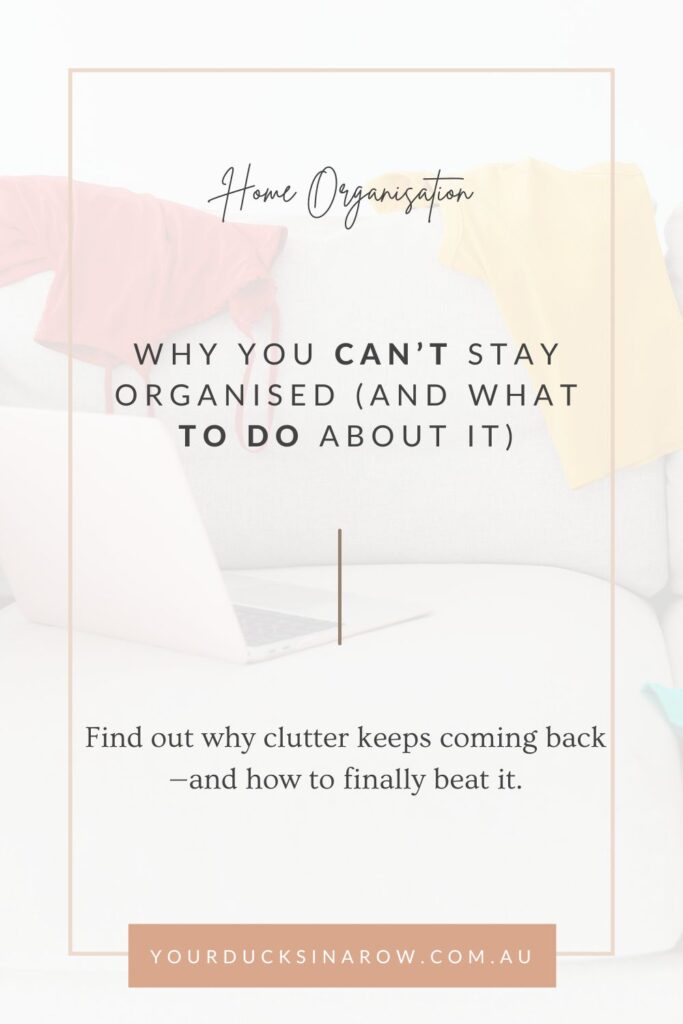Want to know why you can’t stay organised and what to do about it?
Picture this: it’s Monday morning, you’re already running late, and you can’t find your keys. Your bag is overflowing with receipts, your inbox has 1,000 unread emails, and the planner you swore would “change everything” is sitting untouched on your desk. You want to feel on top of things, but instead, you’re stuck in a cycle of clutter, overwhelm, and frustration.
Sound familiar? You’re not alone.
You’ve bought the fancy planner, downloaded five productivity apps, and even colour-coded your calendar, but somehow, staying organised still feels like trying to herd cats.
Sound familiar? Don’t worry, you’re not alone.
Many of us want to be organised, but something keeps derailing our best-laid plans. The good news? It’s not about being “lazy” or “bad at time management”, it’s usually about mismatched systems, unrealistic expectations, or unaddressed habits.
Organisation isn’t one-size-fits-all. What works for your best friend, your boss, or that influencer with the spotless desk may not work for you, and that’s perfectly fine. The trick is to figure out why your current approach isn’t sticking and make small, practical tweaks that actually fit into your life.
Let’s unpack why staying organised can be so hard, and what you can actually do about it.

-
You’re Using Someone Else’s System

Just because a method worked for your favourite productivity influencer doesn’t mean it’ll work for you. Maybe you’re a visual thinker trying to follow a rigid list system, or a free spirit cramming yourself into an hourly planner. No wonder it feels like a struggle!
Sometimes we forget that organisation is deeply personal. A system that feels natural for one person can feel suffocating for another. For example, if you’re a creative type, endless spreadsheets might feel overwhelming. On the other hand, if you thrive on structure, an open-ended bullet journal may leave you more scattered than sorted.
What to do instead:
Experiment. Try different methods, but adapt them to you. If you love visuals, try a Kanban board or a whiteboard calendar. Prefer digital? Find a simple, flexible app that doesn’t overwhelm you with features. The right system is one you actually enjoy using and if you don’t enjoy it, chances are you won’t stick with it.
-
You’re Expecting Perfection

A lot of people give up on being organised because they can’t do it perfectly. One missed appointment or forgotten task, and it feels like you’ve failed completely.
But here’s the truth: nobody gets it right 100% of the time. Life is messy, and organisation should be there to support you, not stress you out. If you think about it, even the most organised people you know still forget things or reshuffle plans. The difference? They don’t beat themselves up over it.
What to do instead:
Shift your mindset. Organisation isn’t about being perfect, it’s about making life easier. Missed a to-do? No stress. Adjust and keep going. Progress, not perfection, is the goal. Think of it like brushing your teeth, missing once doesn’t mean you give up completely, it just means you pick up the brush again tomorrow.
-
You’re Overcommitting

If your calendar looks like a game of Tetris, you’re not disorganised, you’re overloaded. No system can save you from burnout if you’re trying to do too much.
It’s easy to say “yes” to everything: projects at work, social events, and family commitments. But filling every hour of your week leaves no breathing room. When there’s no space, even the best planner can’t stop you from feeling frazzled and behind.
What to do instead:
Start saying no. Prioritise what really matters. Give yourself buffer time between tasks and appointments. Organising isn’t just about putting things in order, it’s about making space for what’s important. Remember: being busy isn’t the same as being productive.
-
You’re Ignoring the Boring Stuff

Tasks like “clean out inbox” or “update budget spreadsheet” aren’t exciting, but they pile up when ignored, and chaos follows. The little things do matter.
These small, repetitive jobs are often the glue that holds your bigger systems together. Without them, cracks start to show, and suddenly you’re drowning in overdue bills, lost emails, or cluttered desktops.
What to do instead:
Schedule “maintenance sessions.” A weekly 30-minute tidy-up of your digital and physical spaces can save you hours later. Make a coffee, put on a podcast, and get it done. By building these into your routine, they’ll feel less like chores and more like regular self-care for your space and schedule.
-
You’re Not Accounting for Life

Life throws curveballs, sick days, surprise meetings, flat tyres. If your plan doesn’t include room for the unexpected, it’s going to fall apart fast.
Too often, we create beautiful schedules that look great on paper but collapse the moment something unplanned happens. A rigid plan doesn’t leave space for life to happen, which is why flexibility is key.
What to do instead:
Build flexibility into your routine. Don’t pack every minute of your day. Leave “white space” for rest, thinking, or dealing with surprises. A resilient plan is better than a rigid one. The more you plan with breathing room, the easier it will be to adapt when things don’t go as planned.

Staying organised isn’t about being a perfectly efficient robot, it’s about creating systems that support your life, in all its messy, human glory.
So if your current approach isn’t working, that’s OK. Try something different. Be kind to yourself. And remember: being organised isn’t the goal. Living well is.
The key to staying organised is a system that fits your unique habits and needs. Let Ducks in a Row help you build that system. Check out our training and resources.


